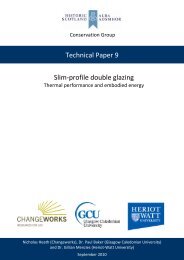ICOMOS Reactive Monitoring Mission to Edinburgh - Historic Scotland
ICOMOS Reactive Monitoring Mission to Edinburgh - Historic Scotland
ICOMOS Reactive Monitoring Mission to Edinburgh - Historic Scotland
Create successful ePaper yourself
Turn your PDF publications into a flip-book with our unique Google optimized e-Paper software.
Appeals against refusal of planning permission, conditions attached <strong>to</strong> a<br />
planning permission, or an enforcement notice are lodged with the Scottish<br />
Ministers. The Direc<strong>to</strong>rate of Planning and Environmental Appeals (DPEA)<br />
considers these. It makes most of the decisions on behalf of Scottish Ministers,<br />
although Scottish Ministers will themselves take decisions where issues of<br />
significant national importance are involved.<br />
Planning decisions must be based on an open and fair consideration of all the<br />
relevant issues, with the same information being made available <strong>to</strong> all<br />
interested parties. For their part, Scottish Ministers – and particularly Mr<br />
Stewart Stevenson, the Minister for Transport, Infrastructure and Climate<br />
Change (in whose remit Planning resides) – cannot act in any way which might<br />
be seen as prejudicial <strong>to</strong> the process. In effect, this restricts Ministers’ scope<br />
<strong>to</strong> become involved or pass comment on a proposed development before a<br />
decision has been taken, whether by a reporter or by the Minister. While a<br />
planning decision is made under the collective name of the Scottish Ministers,<br />
in practice it is a matter for the Planning Minister alone <strong>to</strong> decide; other<br />
Ministers must not attempt <strong>to</strong> influence the Planning Minister. However, the<br />
Planning Minister would be debarred from any involvement in a planning case<br />
within his/her own parliamentary constituency, <strong>to</strong> ensure impartiality is<br />
maintained in decision‐making. These constraints are necessary <strong>to</strong> ensure that<br />
decisions cannot be successfully challenged in the Courts, and are consistent<br />
with the Scottish Ministerial Code.<br />
7.6 Planning Modernisation<br />
<strong>Scotland</strong>'s planning system is currently undergoing the most significant<br />
modernisation in over 60 years.<br />
The 2005 White Paper, Modernising the Planning System was developed<br />
following an extensive programme of consultations and stakeholder<br />
engagements on all aspects of the planning system.<br />
The Planning etc. (<strong>Scotland</strong>) Act 2006 is in the process of being implemented<br />
and represents a landmark piece of legislation.<br />
The Scottish Government aims <strong>to</strong> deliver a modern planning system that is:<br />
• Efficient: up‐<strong>to</strong>‐date development plans <strong>to</strong> be at the heart of an efficient<br />
system that provides certainty for users and local people<br />
31



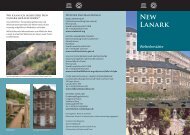
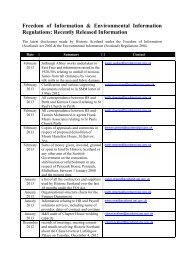
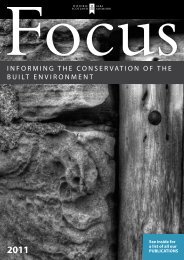

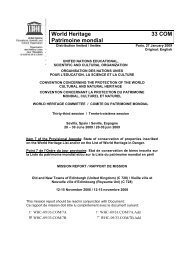





![Elgin Cathedral Wedding Brochure [pdf, 544kb] - Historic Scotland](https://img.yumpu.com/22301571/1/190x151/elgin-cathedral-wedding-brochure-pdf-544kb-historic-scotland.jpg?quality=85)


